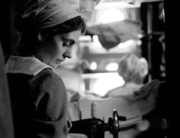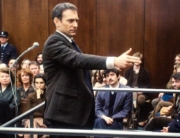The opening of Polisse announces the assuredness of actress-turned-writer/director Maïwenn’s study of Paris cops working in the Child Protection Unit. A cute little girl is being questioned about her father (“Daddy scratched my bottom” she says). Intercut among the questions and answers are the film’s credits, accompanied by children in a bouncy sing-along.
Although this opening introduces Maïwenn’s effective balancing of the extreme difficulties of the cops’ jobs with the innocence of children, it also reveals a
major structural problem. The jagged edges of the intense reality that’s depicted are smoothed over with melodramatic and saccharine touches that often undercut, rather than complement, the wrenching scenes of extreme behavior the cops witness and even participate in.
The unit in Polisse (a deliberate misspelling of “police,” inspired by her son’s drawing, according to Maïwenn) is led by the irascible and emotional Fred, the lone black officer on the beat. The movie’s dramatic conceit is Melissa, a photographer from the Ministry of the Interior on assignment to record them in action. She follows them on their assignments and inevitably runs into conflict with some in the unit, who feel she exploits them as she aims her camera without any qualms about invading anyone’s privacy.
Polisse, at its wrenching best, shows with a quasi-documentary feel the quotidian horrors these heroic men and women confront every day. The script by Maïwenn and Emmanuelle Bercot (also in the film as one of unit’s members) vividly and forcefully
dramatizes such characters as a married man who is arrested for raping his young daughter. He acts arrogantly and unapologetically because of his well-placed political connections. Indeed, the cops’ boss stops their hard questioning of the suspect and orders them to go easy on him.
Then there’s an extraordinarily poignant scene of a despairing (and homeless) immigrant woman who arrives at the station with her young son and begs the cops to find a place for them to live. When they can find a home only for him, she thanks them and leaves her son with them, and after she exits, he starts crying so intently that even these cops who have seen everything find it difficult to deal with him. Fred volunteers to take the child home, but is talked out of it by his supervisor, who reminds him that he can’t insert himself into other people’s lives.
However, during some of the most intense sequences, the director cuts to shots of Melissa (played by Maïwenn) snapping away, which ends up being completely superfluous to the rest of the film, especially when she constantly moves her eyeglasses out of the way so she can take pictures, making her look like a rank amateur. (That we later discover that her glasses are merely a prop so that she looks more “professional” doesn’t erase its gratuitousness.)
Soon, Fred and Melissa begin seeing each other, which complicates their working and personal lives (Fred has a child with his wife, and Melissa has two children and a long-time boyfriend). Although Polisse powerfully shows how the crushing intensity of their work also affects them psychologically off the job, their relationship never rings true, as if Maïwenn desperately wanted a positive relationship to offset the broken ones scattered throughout the movie. But there are already many convincing moments of the cops off-duty dealing with (or ignoring) their demons, often with bitter humor, so Fred and Melissa getting together—like the character of Melissa—seems unnecessary.
The acting by the large cast is entirely persuasive, led by a remarkable portrayal of Fred by Martinique-born rapper Joeystarr. Karin Viard (who curbs her tendency to overact) is unerringly truthful as Nadine, trying to balance her strained marriage and strained friendship with her partner Iris (a superb Marina Foïs). In an unforgettable cameo, Sophie Cattani (also magisterial in Claude Miller’s I’m Glad My Mother Is Alive) plays a drug-addled mother.
In her attempt to inject levity into the downbeat narrative, Maïwenn goes too far in the direction of crude humor, as when a teenage girl admits to performing fellatio in order to get her cell phone back. (When she’s told, “You don’t give head for a phone,” the girl promptly retorts, “It was a Smartphone!”) The cops questioning her keep breaking into laughter over the absurdity of the entire episode, and one of the women even returns to the room to crack one last joke. Such a scene, while entirely plausible as another way for these overworked men and women to deal with the insanity they face daily, comes at the expense of a clueless young girl and so seems off a bit queasy to this viewer.
The film’s climax—in which a member of the unit makes a snap decision and commits a shocking act, in slow motion, no less—is paralleled by the police officers’ taking their children to the first day of school. So despite being a tough, unblinking study for much of its length, Polisse is at bottom a conventional crime drama.





